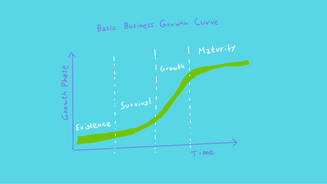- Osome Blog SG
- Scaling Your Business to New Heights: Tips from Entrepreneurs
Scaling Your Business to New Heights: Tips from Entrepreneurs
- Modified: 5 May 2025
- 10 min read
- Better Business


Jon Mills
Author
Jon gets his kicks writing content that educates and entertains. He has a background in copy and content writing for brands and has been lucky to share unique stories, adding value to luxury products. Now, he brings the journeys and advice of our in-house accounting experts and small business owners to life for Osome's readers. He wants to help entrepreneurs set their sights high and build flourishing, reputable businesses.
Scaling a business can be an exciting and challenging experience. It involves taking your business to the next level by increasing its size, reach, and profitability. As an entrepreneur, it is essential to understand the ins and outs of scaling, and to learn from the experiences of other entrepreneurs who have gone through the process. In this article, we’ll explore some tips from successful business owners on how to take your business to the next level.
What Is Scaling in Business?
When we talk about scaling a business, we’re referring to the process of growing a business by increasing its revenue, customers, staff, and operations. In other words, scaling involves expanding the size and scope of your business. The goal of scaling is to increase profitability, reach new markets, and create a sustainable business model.
Remember, scaling is not the same as growth. Growth implies a steady increase in revenue and market share, while scaling involves a significant expansion of the business.
Scaling a business can be a challenging process, but it's also an exciting opportunity for entrepreneurs and business owners. There are several strategies that can be used to scale a business, including:
- Increasing marketing efforts: One way to scale a business is to increase marketing efforts to reach new customers. This can include advertising, social media marketing, and other forms of promotion.
- Expanding product or service offerings: Another way to scale a business is to expand the products or services offered. This can help attract new customers and increase revenue.
- Hiring additional staff: As a business grows, it may need to hire additional staff to handle increased demand. This can help improve efficiency and productivity.
- Investing in technology: Technology can help businesses scale by improving processes and automating tasks. This can help reduce costs and increase efficiency.
Scaling a business takes careful planning and execution. Make sure you have a clear understanding of your business goals and the resources needed to achieve them. You'll also need to be prepared to make changes to your business model as you scale, including adjusting your pricing, marketing, and operations strategies.
Overall, scaling a business can be a challenging but rewarding process. By increasing revenue, reaching new markets, and creating a sustainable business model, you can take your business to the next level and achieve long-term success.
When Is the Right Time To Scale a Business?

Scaling a business too early or too late can be detrimental to its success. So, when is the right time to scale a business? The decision to scale a business should be based on several factors, including market demand, profitability, and available resources. It's important to assess your business's current position and determine whether it is ready for expansion. Here are a few factors you should be mindful of when you’re thinking about scaling your business.
- Market demand— if your product or service is consistently in high demand, isn’t expansion the next step. However, it's important to ensure that the demand is sustainable and not just a temporary trend.
- Profitability— if your business is consistently generating strong financials and profits, it may be a good time to scale. This can help you take advantage of your success and expand your reach to new customers and markets.
- Access to funding or investment opportunities— if you have access to capital or investment, think about allocating those resources to expand your business.
- The ability to hire and train new employees— if you have the resources and infrastructure in place to support new hires and provide them with the necessary training and support, you could consider expanding your team and your business.
Act with caution. Don’t scale too quickly. Scaling too fast can put a strain on your business's resources and lead to overextended operations. A slow and steady approach to scaling may be more beneficial in the long run. It allows you to carefully assess each step of the expansion process and make adjustments as needed.
Advice From Experienced Entrepreneurs on Scaling Your Business
Scaling a business can be a daunting task, but it can also be one of the most rewarding experiences for any entrepreneur. To help you navigate the process, we've gathered some advice from experienced business owners who have been through the ups and downs of scaling their own companies.

Focus on what your business does well
One of the most important things to keep in mind when scaling your business is to identify what your business does best and focus on scaling those strengths. It can be tempting to try and do everything at once, but this can lead to spreading yourself too thin and diluting your brand.
For example, if you run a marketing agency that specialises in social media, don't try to expand into website design or SEO services unless you have the expertise and resources to do so. Instead, focus on becoming the go-to agency for social media marketing, and build your reputation and client base in that area.
Build a strong team
Scaling your business takes a team effort, and hiring the right people is essential. Invest time and resources into finding and training the best talent, and make sure they share your vision and values.
As your business grows, you'll need to delegate more responsibilities to your team members. This can be challenging, especially if you're used to doing everything yourself. But by building a strong team, you'll be able to trust that your business is in good hands, and you can focus on the bigger picture of scaling and expanding your operations.
Use technology to your advantage
Technology can be a game-changer when it comes to scaling your business. Embrace automation and digital tools to streamline your operations and increase efficiency. This will free up time and resources to focus on scaling the business.
Example
If you run an ecommerce store, consider using an inventory management system to keep track of your products and orders. This will help you avoid out-of-stock products and ensure timely deliveries, which can lead to higher customer satisfaction and repeat business.
Stay focused on your customers
At the end of the day, scaling your business should always be driven by the needs of your customers. Make sure you are providing value and meeting their needs as you expand your business.
Take the time to listen to your customers' feedback and incorporate their suggestions into your growth strategy. This will help you build a loyal customer base and increase your chances of success in the long run.
By following these tips from experienced entrepreneurs, you'll be well on your way to scaling your business and achieving your goals. Remember to stay focused on your vision, and don't be afraid to take calculated risks and try new things along the way.
Best Business Scaling Models and Strategies
There is no one-size-fits-all approach to scaling a business. Different businesses may require different scaling models and strategies, depending on their industry, target market, and resources. Here are some of the most popular scaling models:
- Franchising: This involves licensing your business model and brand to other entrepreneurs who can then open their own franchise locations.
- Licensing: This involves licensing your intellectual property or product to other businesses for a fee.
- Partnerships: This involves partnering with other businesses to expand your reach and access new markets.
- Joint ventures: This involves partnering with another business to create a new product or service.
When it comes to scaling strategies, here are some of the most effective:
- Marketing and advertising: Expand your marketing efforts and invest in advertising to reach new customers.
- Product diversification: Expand your product line or service offerings to attract new customers and increase revenue.
- Acquisitions and mergers: Consider acquiring or merging with other businesses to expand your reach and customer base.
- International expansion: Explore new markets and expand your business to other countries.
Entering new markets

Osome spoke with entrepreneur Ben Alistor, 7-figure Amazon FBA seller. Here’s what he had to say about international expansion:
Just remember, while stepping into new markets, re-education is key. Understand the trends, the quirks of that market.
"And tread carefully — you wouldn't plunge headfirst into unknown waters, would you? Start with what you're ready to lose and then go from there. That's how you play the long game in ecommerce."
The Difference Between Growth vs Scaling
It's important to understand the difference between growth and scaling. While the two terms are often used interchangeably, there are some key differences:
Growing a Business
Growing a business involves increasing its size and revenue over time. This typically involves expanding your customer base, increasing sales, and possibly introducing new products or services. The growth process can be gradual and linear, often involving more resources in proportion to the increased size of the business. For instance, you may need to hire more employees as your sales increase or invest in more equipment as your production needs grow. While growth can lead to increased profits, it's important to manage it carefully to avoid exceeding your business’s capacity and maintain sustainable development.
Growth:
- Involves a steady increase in revenue and market share over time
- Can be achieved through tactics such as marketing and advertising, increasing sales, and expanding the product or service line.
- Focuses on increasing the size of the business while maintaining its existing structure.
Scaling a Business
Scaling a business, on the other hand, is about increasing revenue at an exponential rate while adding resources at an incremental rate. It involves streamlining and improving efficiencies across the business to handle increased demand without compromising service or product quality. When a business scales, it adjusts its operations to support larger workloads and greater output with minimal increase in costs. This could involve implementing automation, improving processes, and leveraging technology to increase productivity. Scaling is a more ambitious and strategic process than just growth and requires careful planning and execution.
Scaling:
- Involves a significant expansion of the business, such as increasing the number of employees, locations, or product offerings.
- Aims to achieve exponential growth and increase profitability.
- Often means restructuring the business model to accommodate the increased demands on resources and operations.
Key Challenges for Scaleups
Scaling a business is not without its challenges. Here are some of the most common challenges that entrepreneurs face when scaling their businesses:
Investment
Investment is a critical aspect of scaling a business. This can take the form of injecting personal funds, attracting external investors, or securing business loans. The funds can be used to increase marketing efforts, hire more staff, acquire advanced technology, or expand product lines. However, it's crucial to have a solid financial plan in place to ensure that the investments are used effectively and provide a return. It's also important to understand that with investment comes increased expectations and accountability, especially when dealing with outside investors.
Scalable Processes
Scalable processes are systems that can handle an increase in workload without compromising performance or output quality. These processes are typically automated and rely on technology to handle repetitive tasks, freeing up human resources for more strategic, value-adding roles. Examples of scalable processes include automated customer service systems, digital marketing automation tools, and cloud-based data storage solutions. By implementing scalable processes, a business can increase efficiency, reduce costs, and ensure a consistent quality of service as it grows.
Autonomy for Employees: Control for Managers
Scaling a business often involves building a larger team, which brings with it a necessary shift in management style. Employees need to have a certain level of autonomy to do their jobs effectively and feel empowered. At the same time, managers need to maintain control over the business operations. This balance can be achieved through clear communication of expectations, establishing performance metrics, and implementing systems for accountability. Managers should also foster a culture of trust and transparency, where employees feel comfortable taking initiative and making decisions.
Embed Values in the Company Culture
As a business scales, maintaining its core values and mission can become challenging but remains essential. The company culture, defined by these values, should be a guiding force for decision-making, employee behavior, and company practices. As new employees come onboard, they should be introduced to these values and understand their importance. Regularly reinforcing these values in company meetings, performance reviews, and through leaders' actions can help embed them into the company culture. A strong, value-driven culture can support a business in its scaling journey by ensuring consistency, promoting employee engagement, and enhancing the company's reputation.
Common Mistakes When Scaling a Business
Given these challenges that entrepreneurs face when scaling their businesses, there are a few pitfalls that can potentially hinder the scaling process. Let's discuss some common mistakes when scaling a business, and how to avoid them.
1 Scaling too soon
One of the most common errors businesses make is attempting to scale before they are ready. Scaling should ideally happen after validating a business model that is capable of achieving profitability and demonstrating sustainable demand for your product or service.
2 Neglecting cash flow management
During scaling, there can be a lot of outflow of cash into various growth initiatives like hiring, marketing, and product development. It's crucial to keep a close eye on cash flow to ensure your business doesn't run out of resources.
3 Overlooking the importance of a strong team
Many entrepreneurs try to scale their businesses without the necessary support in place. Building a reliable and skilled team is vital to handle the increased workload and diverse challenges that come with expansion.
4 Ignoring customer service
As businesses grow, it's common to focus heavily on acquisition and forget about retention. But customer service shouldn't suffer during scaling; maintaining a high level of service is key to retaining customers and sustaining growth.
5 Not establishing scalable systems
Sometimes, businesses grow faster than their operational capabilities. This can lead to bottlenecks and inefficiencies. Having scalable processes and systems in place is necessary for smooth operations as the business grows.
6 Failing to adapt the business plan
The business plan that worked at the startup stage might not work during scaling. It's important to revisit and revise your business plan to reflect your current circumstances and future aspirations.
7 Neglecting company culture
Rapid scaling can sometimes lead to a dilution of the company's culture. It's important to maintain and reinforce your company's core values and culture during times of rapid growth.
8 Poor communication
As teams grow larger, communication can become more complex and, if not managed properly, can lead to confusion and inefficiencies. Implementing effective communication strategies and tools is vital when scaling.
By being aware of these common mistakes, you can better prepare your business for successful scaling. Remember, scaling is not just about rapid growth, but about growing sustainably and strategically to build a long-term successful business.
Is It Time To Scale Your Business?
Scaling a business is an exciting and challenging process that involves significant investment of time and resources. To succeed in scaling your business, it's important to understand what scaling involves, when the right time to scale is, and the best models and strategies for scaling. By learning from the experiences of successful entrepreneurs and keeping an eye on the challenges and opportunities presented by the current economic situation, you can take your business to the next level.
Why not speak to one of Osome’s expert accountants to see if its time for you to scale your business and enter a new phase of your entrepreneurial journey?







